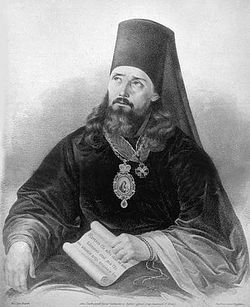
After he was ordained to the priesthood, he spent a year as a parish priest in Irkutsk, and then volunteered to go into missionary work in Alaska, though many other clergy were afraid to do so, because they had heard it was a wild country filled with dangerous savages. His wife broke into tears when she heard the news of this mission, but was unable to dissuade him, so at age 26, he and his family traveled over 2,000 miles, taking over a year to complete this arduous journey, and arrived finally in the Aleutian Islands in 1824.
He built a church with his own hands, traveled to remote areas by kayak, dog sled, even reindeer. He learned six dialects of the native language and developed the first written alphabet for the native Aleuts. He translated the Bible and other sacred books into their language. Years later, he also translated scriptural books into other Alaskan native languages. He also studied all aspects of the local area, and wrote ethnographic, geographical and linguistic works for which he later was elected an honorary member of the Russian Geographical Society and Moscow Royal University.
He returned to Russia to seek more resources and support for the Alaska mission, where, after his wife died, he took monastic vows and the name Innocent, after Bishop Innocent of Irkutsk. He was later consecrated Bishop, and was assigned to the new see of Kamchatka-kurils and the Aleutian Islands, to which he returned, tirelessly building churches, guiding priests, seeking to bring the Gospel and the Holy Orthodox Church to native peoples of Alaska. He encouraged the use of English, and the use of indigenous clergy.
He was later made Archbishop, and later, having returned to Russia, ultimately became Metropolitan of Moscow, where he continued his missionary zeal, establishing and guiding an Orthodox Missionary Society. He is perhaps especially remembered for his zeal to bring the gospel to the world. The apostolic preaching of Metropolitan Innocent spread to a vast territory including Alaska and Chukotka, the Aleutian, Kurils and Commander Islands, eastern Siberia, the Amur region, Kamchatka and the Far East. Metropolitan Innocent brought the light of Christian faith to the Aleutians, Koloshes, Kurils, Eskimo, Kenai, Chugaches, Kamchadals, Oliutores, Negidales, Mongols, Samogirs, Golds, Gulyaks, Koryaks, Tungus, Chukcha, Yakutians, and Kitians.
The preaching of the gospel was a primary achievement in the life of Metropolitan Innocent and occupied a special place in his apostolic service. The metropolitan had a great homiletic gift and was a remarkable preacher. He never missed an opportunity to preach and talk to people and tirelessly instructed his clergy to do the same.
Holy St. Innocent, pray to God for us.
Our Father among the saints, St. Innocent, Metropolitan of Moscow, Enlightener of Siberia & America, is commemorated on March 31.
Troparion in Tone 3:
O holy hierarch Innocent our father, thou who wast first to teach the tribes which before lay in heathen darkness, and first to show them the way to salvation, who didst labor as an apostle in the enlightenment of Siberia and America: Entreat the Master of all, that He grant peace to the whole world and great mercy to our souls.
Kontakion in Tone 4:
Thou wast a true and truthful teacher; for, having thyself done what the Lord commanded, thou didst thereby teach and instruct in piety those who came to thee, didst enlighten unbelievers to recognize the true Faith, illumining them with holy baptism. Wherefore, thou rejoicest with the apostles, receiving the honor of an evangelist of Christ.

These texts were the fruits of St. Innocent (Veniaminov) and later of the Orthodox Missionary Society which he established:
Holy Gospels, 1858
http://leb.nlr.ru/edoc/330383/
Short Sacred History, 1866
http://leb.nlr.ru/edoc/330397/
Kannonik, 1883
http://leb.nlr.ru/edoc/330391/
Canon of Holy Pascha, 1883
http://leb.nlr.ru/edoc/330396/
Holy Gospels, 1883
http://leb.nlr.ru/edoc/330415/
Psalter, 1887
http://leb.nlr.ru/edoc/330390/
Chasoslov (Horologion), 1887
http://leb.nlr.ru/edoc/330384/
Teaching about the Orthodox Christian faith, 1891
http://leb.nlr.ru/edoc/330381/
Holy Gospels, 1898
http://leb.nlr.ru/edoc/330401/
http://leb.nlr.ru/edoc/330389/
http://leb.nlr.ru/edoc/330379/
The Wisdom of Jesus son of Sirach (Old Testament book "Sirach/Ecclesiasticus"), 1900
http://leb.nlr.ru/edoc/330395/
Paschal verses at "Lord, I have called", troparia, kontakia, maginifcation and sermon of St. John Chrysostom, 1902
http://leb.nlr.ru/edoc/330402/